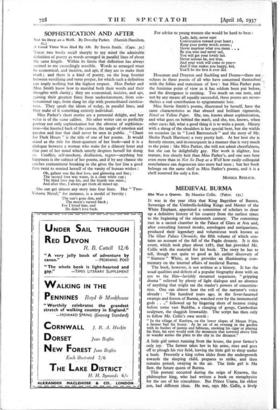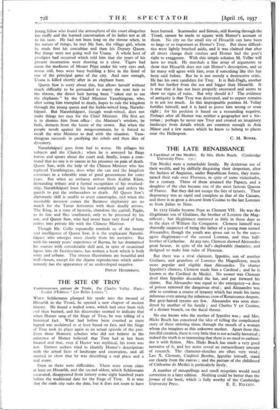MEDIEVAL BURMA
She Was a Queen. By Maurice Collis. (Faber. 15s.)
IT was in the year 1829 that King Bagyidaw of Burma, Sovereign of the Umbrella-holding Kings and Master of the White Elephant, appointed a committee of scholars to draw up a definitive history of his country from the earliest times to the beginning of the nineteenth century. The committee
met in a sacred chamber in the Palace of Glass at Ava and, after consulting learned monks, astrologers and antiquarians, produced their legendary and voluminous work known as The Glass Palace Chronicle, the fifth volume of which con- tains an account of the fall of the Pagan dynasty. It is this event, which took place about 1287, that has .provided Mr. Collis with the material for his book. The story he has to tell, though not quite so good as his earlier discovery of " Siamese " White, at least provides an illuminating com- mentary on the internal affairs of medieval Burma.
The book, however, is not written as a history. It has the usual qualities and defects of a popular biography done with an eye to the film—lavishly mounted sequences, " gripping drama " relieved by plenty of light dialogue and an absence of anything that might tax the reader's powers of concentra- tion. One can almost hear the roll of the narrator's voice already : " Six hundred years ago, in the fever-haunted swamps and forests of Burma, watched over by the immemorial gods . . .," followed up by lingering shots of incense rising before some vast Buddha, a clanging of gongs, Cambodian sculpture, the sluggish Irrawaddy. The script has then only to follow Mr. Collis's own words :
" In the village of Kanbyu, on the lower slopes of Mount Papa, a farmer had his house. As he sat of an evening in the garden with its bushes of jasmin and hibiscus, smoking his cigar or playing his flute, his eyes would seek the mountain that towered above him or wander across the plain to the city in the distance."
A little girl comes running from the house, the poor farmer's only joy. The farmer takes her in his arms, rises and goes off to plough his rice field, leaving the little girl to sleep under a bush. Presently a king cobra slides from the undergrowth towards the sleeping child, prepares to strike, and then remains poised, swaying in the air. The little girl is Ma Saw, the future queen of Burma.
This portent occurred during the reign of Kyazwa, the philosopher king, who had written a book on metaphysics for the use of his concubines. But Prince Usana, his eldest son, had different ideas. He was, says Mr. Collis, a lively young fellow who found the atmosphere of the court altogether too stuffy and the learned conversation of its ladies not at all to his taste. He had not been long on the throne when; in the nature of things, he met Ma Saw, the village girl, whom he made first his concubine and then his Deputy Queen. But things were not going well for Usana. A whole host of prodigies had occurred which told him that the years of his present incarnation were drawing to a close. Tigers had eaten the mediums of Mount Pope under his very eyes and, worse still, bees were busy building a hive in the lintel of one of the principal gates of the city. And sure enough, Usana is killed shortly after in an elephant hunt.
Queen Saw is sorry about this, but allows herself without much difficulty to be persuaded to marry the next heir to the throne, the direct heir having been " taken out to see the elephants " by the Chief Minister Yazathingyan, who, after seeing him trampled to death, hopes to rule the kingdom through the young queen and the feeble-witted king, Narathi- lariat& But Narathihipate, though weak-witted, does not make things too easy for the Chief Minister. His first act is to dismiss him from office : the Minister's wisdom, he feels, detracts from the lustre of the crown. But when the people revolt against his misgovernment, he is forced to recall the wise Minister to deal with the situation. Yaza- thingyan succeeds in pacifying the rebels and then dies of dysentery.
Narathihapate goes from bad to worse. He pillages his subjects and the Church ; when he is annoyed he flings knives and spears about the court and, finally, issues a com- mand that no one is to sneeze in his presence on pain of death.
Queen Saw, with the- help-of the Chinese Minister who has replaced Yazathingyan, does what she can and the kingdom
continues in a tolerable state of good government for some years. But when an embassy arrives from Kublai Khan, demanding tribute and a formal recognition of his overlord- ship, Narathihapate loses his head completely and orders his guards to put the ambassadors to death. All Queen Saw's diplomatic skill is unable to avert catastrophe, and when the inevitable invasion comes the Burmese elephantry are no match for the Tartar horsemen with their deadly arrows. The King, in a state of hysteria, abandons the capital, Pagan, to its fate and flies southward, only to be poisoned by his son, and Queen Saw, who had never been very fond of him, retires into private life with the Chinese Minister.
Though Mr. Collis repeatedly reminds us of the beauty and intelligence of Queen Saw, it is the unpleasant Narathi- hapate who emerges most clearly from his narrative. But with his twenty years' experience of Burma, he has dramatised his sources with considerable skill and, in spite of occasional lapses into sly facetiousness, has written a book which is both witty and urbane. The sixteen illustrations are beautiful and well-chosen, except for the Ajanta reproduction which unfor- tunately has the appearance of an undeveloped negative.
PHILIP HENDERSON.























































 Previous page
Previous page